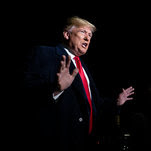|
More than one-fifth of Americans and British people say they are chronically lonely, and this social isolation can be deadly. Researchers find that loneliness is more lethal than either obesity or smoking 15 cigarettes a day. And that’s my column today.
|
Plenty of countries are struggling to figure out how to deal with a “loneliness epidemic” based on this new research, but Britain is actually doing something. It appointed a Minister for Loneliness, so I sat down with her to find out what she does. At first I thought the position was a gimmick, but I left impressed.
|
I became interested in loneliness while reporting on opioids and suicide, and there are things we can to do address this “loneliness epidemic.” I’d recommend encouraging dog ownership (there’s evidence that dogs, though not cats, reduce loneliness), but Britain is taking other approaches that actually seem to be helping. I hope American and other governments will follow the British example. Please read my column!
|
What about Mike Pence?
|
In the impeachment inquiry, we’re all focused on President Trump as Mike Pence slides by under the radar. But I’m deeply suspicious of Pence’s role. After all, it was Pence whose participation in the Ukrainian president’s inauguration was canceled to send a message of Trump’s discontent. Then Pence met President Volodymyr Zelensky on Sept. 1 and spoke to him a few weeks later — so what did Pence say about the delay in military aid, and about what Zelensky needed to do to get a White House visit?
|
Meanwhile, another troubling story about Pence: his role in foreign aid. ProPublica reports that Pence interfered with foreign aid programs that are supposed to be nonpolitical, to ensure money would go to Christian groups that were simply not equipped to handle the sums (one had no full-time staff).
|
Europe and NATO in Trouble
|
French President Emmanuel Macron gave a remarkable interview to The Economist in which he said that NATO is going through “brain death” and that Europe stands on “the edge of a precipice.” The United States may be “turning its back on us,” he added, forcing Europe to work out its own security arrangements.
|
The core of NATO is Article Five, which provides that all NATO members will respond to an attack on one. That’s what protects Estonia from Russian nibbling. But there has always been doubt about whether countries would actually respond in a crisis, and Macron dispensed with platitudes and acknowledged that he didn’t know if Article Five was meaningful. I worry that Russia could engineer some ambiguous activity in Estonia or Latvia (such as Russian “volunteers” nominally “responding” to an attack on ethnic Russians by seizing a border town for a few days) to show that Article Five is hollow. That might destroy NATO.
|
Around the World
|
A student has died in Hong Kong after police clashed with protesters. Circumstances remain unclear, but this will likely give new momentum to the protests. Meanwhile, President Trump and Senator Mitch McConnell have blocked a Senate vote on bipartisan legislation that expresses support for Hong Kong. Effectively they’re standing with Beijing and not Hong Kong.
|
A war in Cameroon has killed thousands and displaced half a million people, but received very little attention. The U.N. Security Council and African Union have averted their eyes, hoping that strongman Paul Biya will solve the problem. He won’t and it could get even worse.
|
At home in the U.S., as I watch the Democratic primary fight I continue to be surprised that Cory Booker hasn’t found more traction. Of those candidates in the lower tier, Booker is the smartest and has the best policy chops, and he would also I think be a strong general election candidate. But he is running out of time to make his mark on voters.
|
|
Our Documentary Trailer
|
My wife, Sheryl WuDunn, and I have a new documentary premiering in a few days. It’s called “Tightrope,” after our forthcoming book of the same name (they’re about the disintegration of working class America, told partly through the kids on my old school bus in rural Oregon). That’s Sheryl and me in the documentary, and here’s the trailer for it.
|
If you’re in New York City, it will show Wednesday and Thursday at DOC NYC Festival. You can find information and tickets here — and join us!
|
And here’s my column about loneliness. I hope it doesn’t seem frivolous. Tens of millions of people in the United States, Britain and other countries suffer unremitting loneliness, and countless thousands die of complications of it. The opioid crisis is linked to it. And Britain shows there are steps we can take to mitigate loneliness, if we take it seriously. Please read!
|
What I’m Reading
|
Anand Giridharadas’s book “Winners Take All” is now out in paperback and is deeply provocative in its critique of philanthropy. He argues that tycoons may give money away at the margins but mostly use their influence to bolster a profoundly unfair economic system that works to their advantage. What’s needed, he argues, isn’t philanthropy but fundamental change in the system itself. I don’t fully agree with his take — I’m much more sympathetic to the role of philanthropy — but it’s a smart and important perspective worth grappling with.
|
You can connect with me on Facebook or Instagram. If you have friends who might enjoy this newsletter, please forward this email or tell them they can sign up here. If you’re looking for more, check out our next book here. Feedback and suggestions welcome at kristof-newsletter@nytimes.com
|



No comments:
Post a Comment